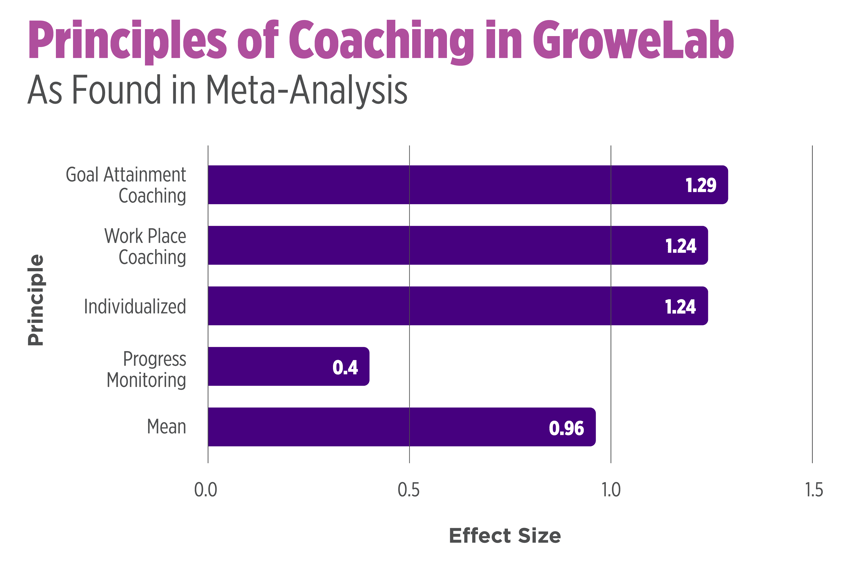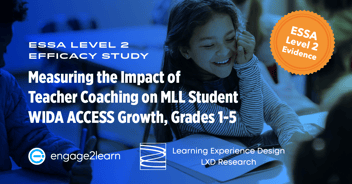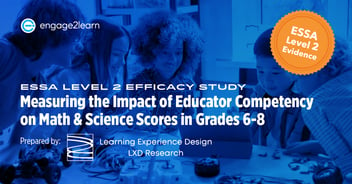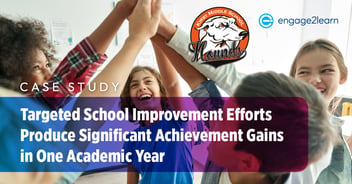How to Transform Your Professional Learning with Evidence-Based Coaching
By: Jill Galloway, Chief of Product Innovation, engage2learn; and Rachel Schechter Ph.D., Founder of LXD Research
Public school districts spend millions of dollars on professional development (PD) each year, despite evidence that traditional, one-size-fits-all PD hardly ever translates to improved practice for educators and accelerated outcomes for students.
In fact, a recent meta-analysis shows that the impact of most PD programs on student scores is by and large insignificant. Perhaps that is because the associated learning opportunities are often broad, unfocused, and lack personalization. How, then, can we transform traditional PD into professional learning that is meaningful for educators, sustainable for districts, and impactful for learners?
Learning sciences tells us that effective instructional coaching must focus on developing teachers as lifelong learners according to their goals, strengths, and interests. There is robust scientific evidence that this kind of coaching works, not just for teachers, but in the workplace in general.
For example, a 2021 meta-analysis by Qing Wang et al., looked at 20 studies and found a high mean effect size of .71 across varying coaching models. Coaching empowers individuals to put their knowledge into practice in the classroom, choose their own goals, and measure and celebrate their growth – all of which support intrinsic motivation. Moreover, coaching focuses on providing ongoing support over sustained periods, ensuring effective and sustainable implementation.
Effect size is an indicator of the practical significance of research findings – in other words, how meaningful the implications of the findings are in the real world. There are different methods for determining effect size. The scale of effect size referenced here is as follows: small effect, 0.2; medium effect, 0.5; large effect, 0.8 or greater.
However, providing ongoing coaching in the public school setting isn’t without its challenges, including but not limited to budget limitations, time constraints, and teacher and stakeholder buy-in. Additionally, coaching can only be as valuable as the tools, methods, and learning framework used to facilitate it. engage2learn's (e2L) all-in-one instructional coaching and talent development platform, GroweLab, is the comprehensive solution to these problems, providing a single location for navigating, differentiating, documenting, and measuring the impact of job-embedded coaching.
In order to ensure an effective and sustainable coaching program, GroweLab leverages research-backed, evidence-based strategies for adult learners, including:
- Individualization
- Competency-based goal setting
- Actionable experiential learning
- Progress monitoring
Learn about other ways to support adult learning with Digital Promise’s Adult Learning Navigator.
Individualization
A crucial element of e2L’s instructional coaching platform is ensuring that coaching is individualized to meet all professional learning needs. Unlike traditional professional development that seeks to provide district-level, uniform change, e2L’s coaching platform seeks to empower individuals through personal development that connects with each learner's cultural and lived experiences. There is strong evidence that coaching that focuses on the needs of individuals is much more effective than group-based professional development, which assumes all learners are the same (Jones et al., 2015).
For example, a meta-analysis on workplace coaching found that the smaller the number of participants being coached at one time, the greater the impact (Dunst et al., 2020). In fact, according to the research, those who experience coaching in smaller groups are three times more likely to have increased self-efficacy, skills, and knowledge, compared to those in larger groups.
Competency-Based Goal Setting
Within GroweLab, teachers utilize leveled rubrics on instructional best practices and professional learning competencies to pinpoint their own areas for improvement, set growth goals, and submit evidence of practice as they work towards achieving those goals. This is integral to ensuring teacher buy-in, putting them in the driver’s seat of their own professional learning. The platform not only allows teachers to choose their own learning goals but also their own starting point, operating on the understanding that teachers know their own needs better than anyone else. Research shows that competency-based coaching is one of the most effective evidence-based strategies for adult learners, demonstrated in multiple studies, meta-analyses, and literature reviews.
Actionable, Job-Embedded Growth
Based on 11+ years of experience and thousands of coaching touches, e2L has perfected an evidence-based coaching conversation model that serves as the basis of an effective and efficient coaching cycle. Leveraging the combined power of job-embedded coaching and GroweLab, coaches are able to conduct and document growth-focused, actionable coaching conversations, engaging learners in deliberate practice through experiential learning.
In 2008, Latham et al., conducted a review of the scientific literature on the topic of goal setting within the public sector and suggested that on-the-job learning with goal setting could be an effective methodology for both peer coaching and self coaching, so long as the goals are specific and not vague. With this in mind, e2L designed GroweLab to empower educators to choose their own concrete, attainable professional learning goals to work toward every day.
Progress Monitoring
As we say at e2L, if it’s not documented, it didn’t happen. Utilizing e2L’s instructional coaching platform, district leaders are able to engage in progress monitoring at the individual, school, and district level. This elegant system allows districts to efficiently manage, track, and analyze coaching and professional learning efforts at scale, while also creating recognition systems to reward and incentivize growth. Within the platform, teachers are able to upload evidence of growth for coaches to review and provide teachers with words of encouragement and constructive feedback.
A 2016 meta-analysis by Harkin and colleagues found that 138 randomized control trials on the impact of progress monitoring showed a mean effect size of .40, suggesting that there is a benefit of this kind of progress monitoring. It is likely, then, that the effect of progress monitoring increases in combination with the other principles of coaching in GroweLab.
Are you ready to take your school or district's professional development to the next level? Learn more about partnership options with engage2learn here!
About LXD Research
LXD Research is an independent evaluation, research, and consulting division within Charles River Media Group, LLC focusing on educational technology. We design rigorous research studies, multifaceted data analytic reporting, and dynamic content to disseminate insights. Visit www.LXDResearch.com.
References
Dunst, C. J., Trivette, C. M., & Hamby, D. W. (2010). Meta-analysis of the effectiveness of four adult learning methods and strategies: Supplemental tables and references. Learning, 3(1), 91-112.
Jones, Rebecca, & Woods, Stephen, & Guillaume, Yves. (2015). The effectiveness of workplace coaching: A meta-analysis of learning and performance outcomes from coaching. Journal of Occupational and Organizational Psychology, 89. 10.1111/joop.12119.
Latham, G.P., & Borgogni, L., & Petitta. L. (2008). Goal Setting and Performance Management in the Public Sector. International Public Management Journal, 11:4, 385-403, DOI: 10.1080/10967490802491087.
Hammond, L., & Moore, W. M. (2018). Teachers taking up explicit instruction: The impact of professional development and directive instructional coaching model. Australian Journal of Teacher Education (Online), 43(7), 110–133. https://search.informit.org/doi/10.3316/informit.789583547607284
Harkin, B., & Webb, T. L., & Chang, B. P. I., & Prestwich, A., & Conner, M., & Kellar, I., & Benn, Y., & Sheeran, P. (2016). Does monitoring goal progress promote goal attainment? A meta-analysis of the experimental evidence. Psychological Bulletin, 142(2), 198–229. https://doi.org/10.1037/bul0000025
Wang, Qing, & Lai, Yi-Ling, & Xu, Xiaobo, & McDowall, Almuth. (2022). The effectiveness of workplace coaching: A meta-analysis of contemporary psychologically informed coaching approaches. Journal of Work-Applied Management. 14. 77-101. 10.1108/JWAM-04-2021-0030.





